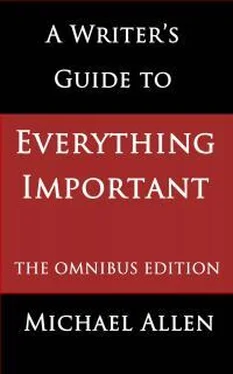Allow me to present an example, drawn from another field of activity. William Goldman, in his book Adventures in the Screen Trade , tells us that, in the 1950s, the actor Montgomery Clift turned down the lead parts in four films. He declined (1) the part in Sunset Boulevard which was later played by William Holden; (2) the part that James Dean later played in East of Eden ; (3) the Paul Newman part in Somebody Up There Likes Me ; and (4) the Marlon Brando part in On the Waterfront .
As you will already have noticed if you know anything about the history of the cinema, each of the actors who picked up a part which had been rejected by Montgomery Clift used that part to establish his own name; each of the four actors who accepted what Clift had declined became a famous star as a result.
None of which would have happened if Clift had decided to play any of the parts himself. And the point is, of course, that the four unknown young actors who benefited from these decisions could in no way have influenced what Clift did.
That is Circumstance at work.
In the next section I shall reproduce an essay which I first published in 2004, about the outstanding success of The Life of Pi , and that will serve as well as anything to demonstrate how Circumstance operates in the world of publishing.
For the present, let me simply suggest that there are not only good reasons for supposing that our formula for success (S :: C) is valid and true, but that there are also substantial benefits to be gained from keeping it ever in mind. Becoming a writer involves considerable wear and tear on the emotions; indeed more than once I have mentioned that writing can literally damage your health. But you will, I believe, find it much easier to cope with the slings and arrows of outrageous fortune if, when you next receive a particularly stupid letter from a particularly stupid publisher, you repeat the following mantra:
Success varies according to Circumstance....
Success varies according to Circumstance....
Success varies according to Circumstance....
Repeat this phrase over and over again, until a sense of calm is restored to your bosom.
There is no point in getting yourself into an uproar over matters that you cannot control. Or even influence.
Next, and before moving on to some case studies of how success was achieved, I need to tell you a little about Nassim Nicholas Taleb.
4.2 Randomness and black swans
In 2001 Nassim Nicholas Taleb published a book entitled Fooled by Randomness , with a revised edition appearing in 2004. The subtitle was ‘The hidden role of chance in life and in the markets.
It turns out, when you study the history of publishing that chance is a major factor in the business; and, for that matter, in the arts generally. Fooled by Randomness therefore constitutes essential reading for any writer who wishes to proceed in a rational manner – as opposed to believing in fairies and the inevitable triumph of talent (which, of course, you have in abundance).
In 2007, Professor Taleb came up with another book, The Black Swan. The subtitle of this book was ‘the impact of the highly improbable’, and in due course it was described in The Sunday Times as one of the twelve most influential books since World War II.
This second book of Taleb’s again contains much material which is highly relevant to the arts in general. Black swans, you see, in Taleb’s terms, are unexpected events which have enormous impact, either for good or evil. The key point here is the unpredictable aspect. After a black swan has occurred, all the smart-arses in the world will claim that they saw it coming – it was all perfectly obvious. But actually they didn’t, and it wasn’t.
Examples of black swans include: the attacks on the twin towers, in New York, in September 2001 (bad, negative impact); the massive sales of Harry Potter books (good, positive impact, particularly if your name is J.K. Rowling); the rise of Christianity; the rise of Islam; the first and second world wars. And so on. In short, black swans are some of the most important and influential events in the history of the human race.
In the years leading up to the publication of The Black Swan, Taleb published on the internet some chapters of the book as ‘work in progress’. I wrote a lengthy essay on some of his draft chapters under the title On the Survival of Rats in the Slush Pile. That essay considers how Taleb’s ideas might apply specifically to the world of publishing; and subsequently Professor Taleb and I had some correspondence.
When the final version of The Black Swan appeared in print, I was pleasantly surprised, and flattered, to find myself referred to in the acknowledgements section as follows:
‘Michael Allen wrote a monograph [a reference to my Rats essay], for writers looking to get published based on the ideas of Chapter 8 – I subsequently rewrote Chapter 8 through the eyes of a writer looking at his lot in life.’
I have to say that this little paragraph is both flattering and alarming. It is flattering because it is easily the greatest compliment that has been paid to me in an intellectual context (and this, if I may modestly say so, in a life not entirely without academic distinction). And it’s alarming because, as you may already have concluded, I do not belong in the same company as the others listed in Taleb’s acknowledgements section. I am not any sort of philosopher, much less a mathematician. I do not belong in the same part of a book as such famous dead names as Hegel and Montaigne, nor even alongside famous living names such as (to pick a few at random) Chris Anderson, Daniel Kahneman (a Nobel laureate), and Benoit Mandelbrot.
If you have not read yet The Black Swan , you might usefully do so. As with its predecessor, Fooled by Randomness, it is, in my estimation, a fascinating read in itself; but you will also find in it much to support my view that Circumstance plays a huge part in any writer’s success, or lack of it.
That point having been made, let us examine a few case studies to demonstrate the point in practice.
4.3 Some case studies
The best example of a novel that became a huge hit – a black swan, in Taleb’s terminology – is, of course the first in the Harry Potter series.
Just in case you don’t know the much-told story, it is worth recording that the first Harry Potter book was rejected by every major publisher in London (some sources say as many as 20). The only publisher to show the smallest degree of interest was Bloomsbury; and, when they finally offered a contract, the firm paid only a small sum of money for it (sources say between £2,000 and £3,000).
Clearly, none of the ‘experts’ who read the book in manuscript, and rejected it, had the slightest inkling of the massive money-making machine which they held in their hands.
However, a less familiar case of Circumstance playing a huge part in a book’s success is the 2002 winner of the Booker Prize: Life of Pi by Yann Martel. The publisher was a small Scottish firm, Canongate.
Many newspapers reports at the time told us that this book had previously been rejected by Faber, the firm which had published Martel’s earlier work; the book had also been turned down by at least five other major publishers. So if Canongate had not taken the book, it is likely that the manuscript would have remained in the author’s filing cabinet. Furthermore, if the book had been accepted by one of the bigger firms, it would not even have been entered for the Booker Prize in the first place, because the big firms are only allowed two nominations and they have to enter their most famous authors; if they don’t, the famous authors are likely to go elsewhere.
Читать дальше












